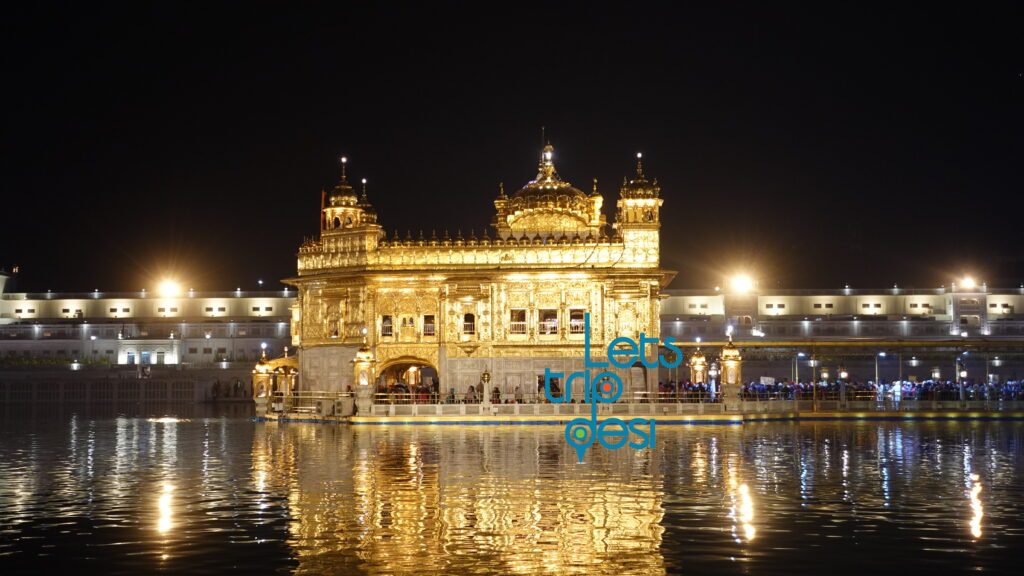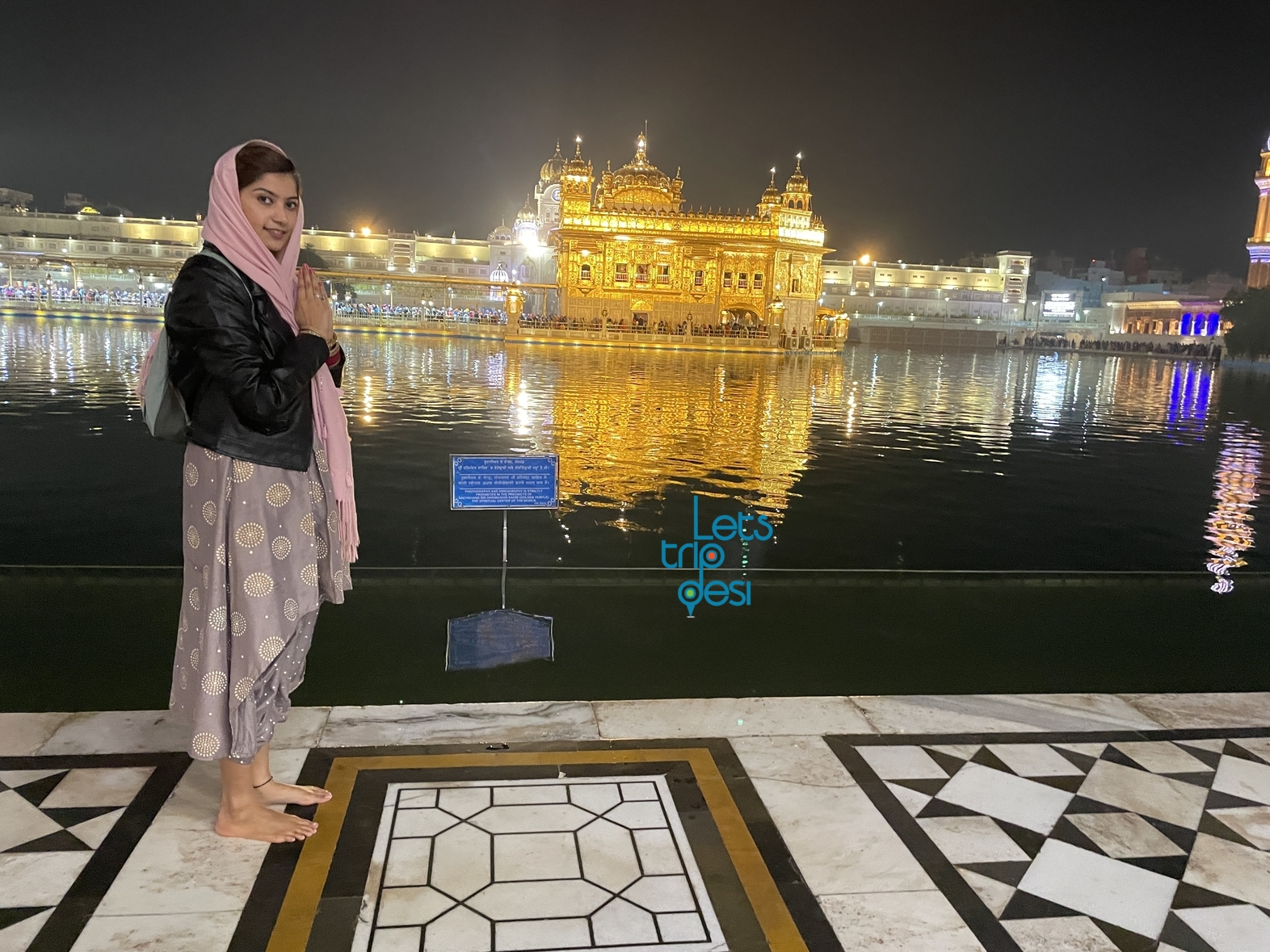Golden Temple Sri Harmandir Sahib Amritsar
One of the spiritual places in India, the Golden Temple, also known as Sri Harmandir Sahib, is the holiest of all Sikhs. Located in the heart of Amritsar, the magnificent golden architecture and modern Langar (community kitchen) attract thousands of visitors and believers every day. The temple is open to people of all faiths and provides free meals of all classes to over 100,000 people.

The Golden Temple is located in Amritsar, the holy city of Sikhism. The Golden Temple is famous for all of its golden dome and is one of the most sacred pilgrimage sites for Sikhs. The Mandir is a two-story, 67-square-foot marble design. Maharaja Ranjit Singh built half of the building with about 400 kg of gold leaf. The Golden Temple is surrounded by many other famous temples such as the Durgiana Temple. The fourth Sikh Guru, Guru Ram Das, started out as a swimming pool here and also built the Golden Temple or Amritsar with Sri Harmandir Sahib. This is where Sage Valmiki wrote the epic Ramayana. Rama and Sita are said to have spent 14 years in exile in Amritsar, the center of Sikhism.
The main temple where the shrine is located is a small part of a large site known to Sikhs as Sri Harmandir Sahib or Darbar Sahib. The spiritual target is Amrit Sarovar, the sarovar that surrounds the magnificent temple. There are many shrines and monuments around the complex. The Sikh Museum is located in the main gate of the clock, which depicts the persecution Sikhs endured through the Mughal, British and Indian governments in 1984. Ramgarhia Bunga is a defensive fortress to the southeast of the chariot. And it is surrounded by two Islamic-style minarets. The Golden Temple is undoubtedly one of the most beautiful attractions in the world.
Also Read: Top Things to Eat in Amritsar | Best Food in Amritsar
Golden Temple History
The land for the Golden Temple was donated by Akbar, Mughal Emperor, and construction began in 1574. The foundation was completed in 1601 under the supervision of the 4th and 5th Sikh Gurus. It has been regularly renovated and refurbished for many years. In the 19th century, the inverted lotus-shaped dome was encrusted with 100 kg of gold and decorative marble. This was accomplished under the auspices of Maharaja Ranjit Singh, a veteran royal who is remembered for his love of the Sikh community.
In 1984, the Indian Prime Minister ordered an attack on the armed Sikh militant hiding in the Golden Temple. More than 500 people have been killed in the fighting and Sikhs around the world have been outraged by criticism of this sacred place. The Sikh communities did not allow the central government to repair the damage caused to the temple, undertaking the work themselves. Although many temples have been erected since then, the incident remains in the memory of the locals.
The Guru Granth Sahib
The Guru Granth Sahib was placed in the temple each morning and returned each night to Akal Takhat (Eternal Throne), the temporary seat of the Khalsa Brotherhood. This ceremony is called Palki Sahib and gives male the opportunity to participate in the worship of this holy book. The Guru Granth Sahib was transported in a heavy palanquin. Male visitors line up at the front and back of the palanquin, carrying the load for a few minutes. It gives everyone a chance to participate and rest. The event is available at 5 a.m. and 9:40 p.m. in winter and at 4 a.m. and 10:30 p.m. in winter.
Architecture of Golden Temple
The Golden Temple is a mesmerising blend of Hindu and Islamic architectural styles and seems to float to the end of a long causeway. It has a beautiful marble plinth decorated with animal and flower motifs by Pietra Dura, also found on the Taj Mahal.
Above is a shimmering second-level environment surrounded by intricately carved gold panels, and above is a 750kg gold-plated dome. The sparkling inner shrine saw priests and musicians continue chanting Guru Granth Sahib, piling into an already devout religion.
After worship, walkers return to the second floor, which is usually decorated with beautiful paintings. The Hari Mandir (central temple) is connected by a marble causeway called Guru’s Bridge. This path describes the journey of the soul’s path after death. Surrounded by marble steps, these tanks are believed to have healing powers that can cure a wide range of diseases.
Also Read: 50,000 Free Hot Meals a Day and 9 Other Amazing Facts About the Langar at the Golden Temple
Best Tips For Visiting Golden Temple
1. Take off your shoes and socks before entering the temple (there is sandal stand at the entrance). Wash your feet in a shallow foot bath located nearby.
2. Dress appropriately. It is a symbol of reverence in Gurudwara, where the body should be completely covered and the head should be covered. Scarves can be rented for free or purchased from scarf retailers for INR 10. However, it is advisable to bring a scarf.
3. Don’t smoke or drink alcohol because that is strictly prohibited.
4. If you want to sit beside the tank, sit cross-legged and do not dip your feet in the water.
5. Photography is permitted around the walkway surrounding the water tank, but not in the Golden Temple.
6. While listening to Gurbani, sit on the ground of Darbar Sahib as a sign of reverence.
World’s Largest Free Kitchen – Guru Ka Langar
If you decide to visit this enigmatic masterpiece, don’t forget to offer and taste the mouth-watering prasad. The temple also has the world’s largest kitchen, which provides free food to people of all religions and faiths.
Guru-Ka-Langar is a large dining room located southeast of the temple complex with approximately 60,000 to 80,000 daily visitors a day come to eat after praying at the Golden Temple. The food is free of charge, but pilgrims often make donations and offer help with the staggering pile of dishes to be washed. It is the humility of the Sikh preaching hospitality that helps everyone from the poor to the rich. The food here is vegetarian so anyone can eat here as well. It is often touted as the world’s largest free kitchen.
Also Read: The Largest And Oldest Tree Of India Where You Must Go
Festivals Celebrated at Golden Temple
One of the most important festivals celebrated at the Golden Temple is Vaisakhi, which takes place in the second week of April (usually April 13). This celebration is held to commemorate the founding of Khalsa. Other celebrations associated with good faith include the birthday of Guru Nanak, the founder of Sikhism, the birthday of Guru Ram Das, and the day of the assassination of Guru Teg Bahadur. Sri Harmandir Sahib is brightly illuminated with lights and diyas on Diwali along with the fireworks display.
The temple has been visited by most Sikhs at least once in their lifetime.
How to reach Golden Temple
The Golden Temple can be reached by local transport such as cars and cycle rickshaws, which are the cheapest and most convenient form of transport. There are also car rental companies that can rent cars to reach the temple. The Golden Temple Trust also offers a free bus service from Amritsar Railway Station.
Road: Driving from Delhi to Amritsar by road is a great option as the two cities are connected by highway.
Rail: Amritsar participates in a very strong rail network with Delhi. Three-wheeled vehicles such as taxis, bicycle rickshaws, and electric rickshaws take passengers to the Golden Temple.
By Air: Amritsar Airport, also known as Raja Sansi International Airport is situated at a distance of 11 km from the city. From there you can take a taxi to reach the Golden Temple.



